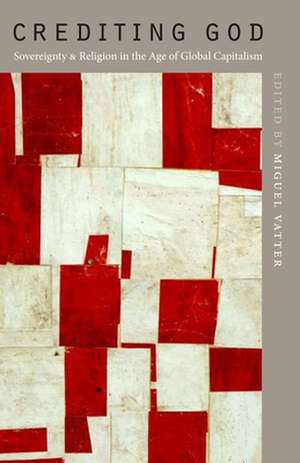Crediting God – Sovereignty and Religion in the Age of Global Capitalism
Autor Miguel Vatteren Limba Engleză Hardback – 2 ian 2011
Preț: 565.49 lei
Preț vechi: 698.13 lei
-19% Nou
Puncte Express: 848
Preț estimativ în valută:
108.20€ • 113.28$ • 89.53£
108.20€ • 113.28$ • 89.53£
Carte tipărită la comandă
Livrare economică 07-21 aprilie
Preluare comenzi: 021 569.72.76
Specificații
ISBN-13: 9780823233199
ISBN-10: 0823233197
Pagini: 374
Dimensiuni: 152 x 229 x 15 mm
Greutate: 0.64 kg
Ediția:New.
Editura: Wiley
ISBN-10: 0823233197
Pagini: 374
Dimensiuni: 152 x 229 x 15 mm
Greutate: 0.64 kg
Ediția:New.
Editura: Wiley
Recenzii
Crediting God is a welcome, multidisciplinary contribution to current debates about sovereignty, political theology, and secularism. Ranging across a variety of religious traditions--including Confucianism, Islam, Hinduism, Judaism, and Christianity--the engaging essays that Miguel Vatter brings together in this volume challenge and deepen our understanding of the political significance of religious fundamentalisms.-Robert Gooding-Williams
This volume, competently edited and introduced by Miguel Vatter, is one ofthe most rigorous and complete presentations of the complex relation between theology and politics around today. Historical references and theoretical questions, issues of dogma and political analyses, intersect around one and the same nucleus of sense which sheds new light on the dynamics and the conflicts of the globalized world.-Roberto Esposito
"This volume edited by Miguel Vatter provides an illuminating and disorienting set of reflections about the relationship between sovereignty, theocracy, secularization, questioning whether the progressive or negative accounts of history that see religion falling away misread the way that religion circulates, and the various forms in which it appears. These essays do not offer a single conclusion on this vast and important topic, but offer a complex and compelling constellation of views, offering a way to rethink the historical presuppositions of secularism and capitalism, the tacit presuppositions of sovereignty, and the prospects for thinking anew the relation between religion and democracy. . . This is a surprising, erudite, and provocative collection."-Judith P. Butler, University Berkeley of California
"Crediting God" offers new frameworks--beyond privatization or secularization or fundamentalism--for political theorists to approach the religious dimensions of public life. The essays foster fresh intellectual alliances, rediscover political classics, and encourage new readers for scholars
This volume, competently edited and introduced by Miguel Vatter, is one ofthe most rigorous and complete presentations of the complex relation between theology and politics around today. Historical references and theoretical questions, issues of dogma and political analyses, intersect around one and the same nucleus of sense which sheds new light on the dynamics and the conflicts of the globalized world.-Roberto Esposito
"This volume edited by Miguel Vatter provides an illuminating and disorienting set of reflections about the relationship between sovereignty, theocracy, secularization, questioning whether the progressive or negative accounts of history that see religion falling away misread the way that religion circulates, and the various forms in which it appears. These essays do not offer a single conclusion on this vast and important topic, but offer a complex and compelling constellation of views, offering a way to rethink the historical presuppositions of secularism and capitalism, the tacit presuppositions of sovereignty, and the prospects for thinking anew the relation between religion and democracy. . . This is a surprising, erudite, and provocative collection."-Judith P. Butler, University Berkeley of California
"Crediting God" offers new frameworks--beyond privatization or secularization or fundamentalism--for political theorists to approach the religious dimensions of public life. The essays foster fresh intellectual alliances, rediscover political classics, and encourage new readers for scholars
